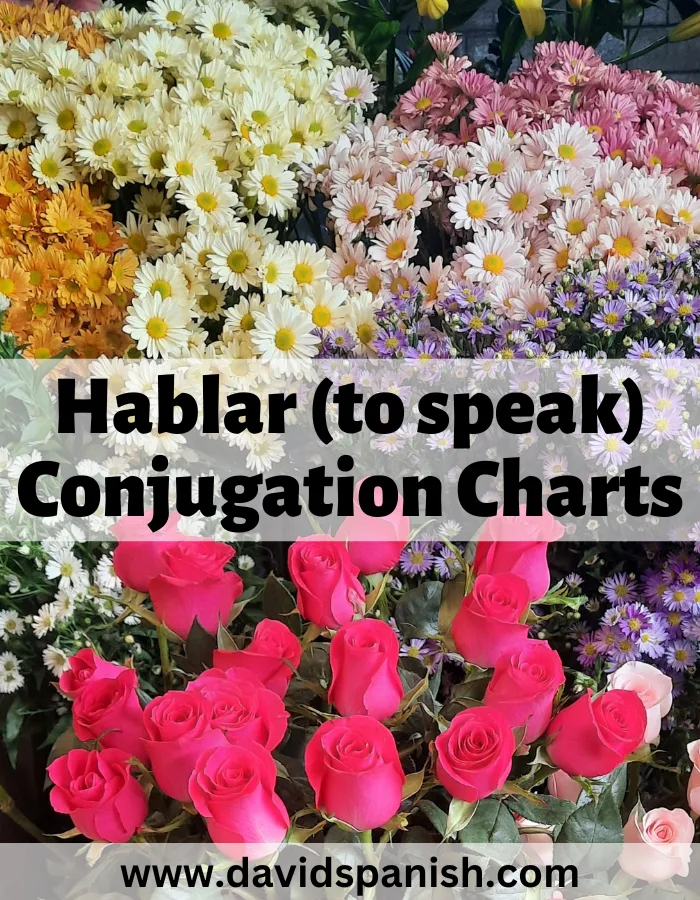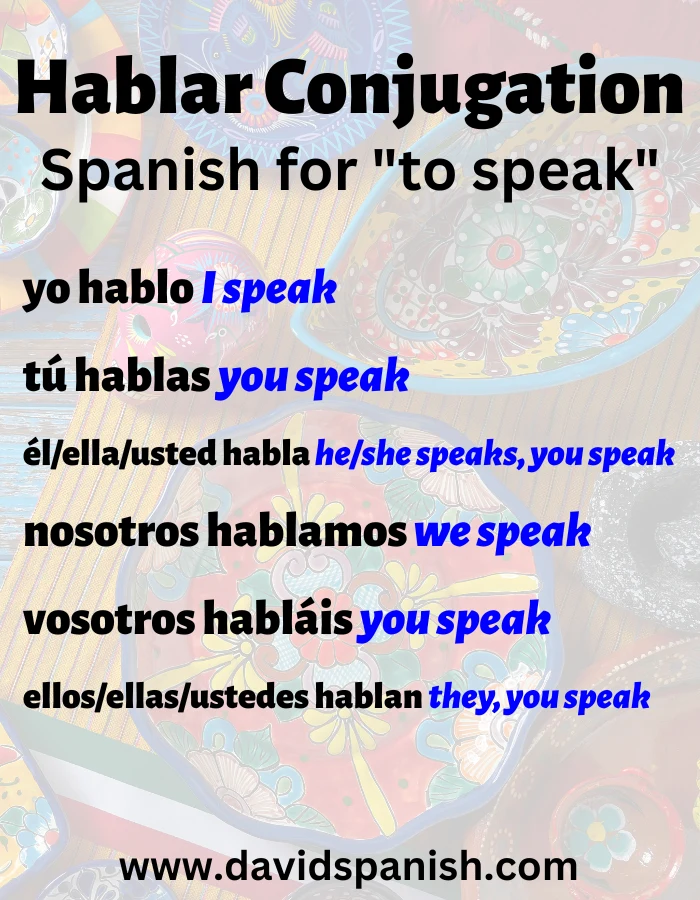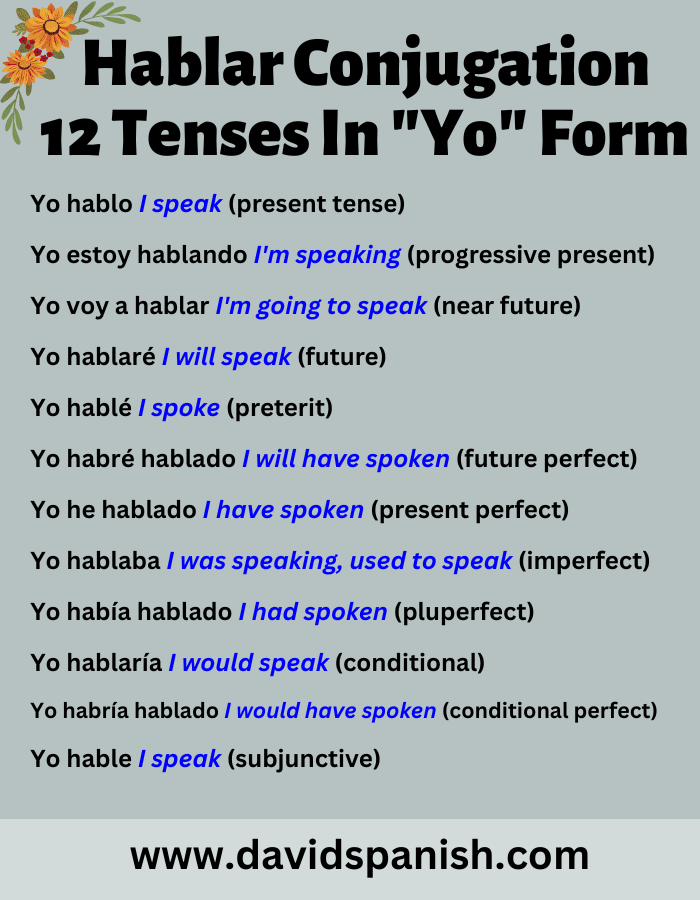How to conjugate the Spanish verb hablar
Hablar is one of the most important verbs in the Spanish language and often the first verb which students learn. The meaning of hablar is “to speak”. The conjugation of hablar in the present tense is: Yo hablo (I speak), tú hablas (you speak), él/ella/usted habla (he, she speaks; you speak), nosotros hablamos (we speak) vosotros habláis, ellos/ellas/ustedes hablan (they speak; you speak).

Hablar is a regular AR verb. This means that its endings are the same as all other Spanish AR verbs. This page on our site covers regular and irregular Spanish AR verbs in detail.

Further down the page we’ve provided verb conjugation charts for hablar in the following nine tenses. Keep reading as we’ve also provided example sentences for each verb tense.
- Present tense (el presente de indicativo)
- Progressive present tense (el presente progresivo)
- Near future tense (futuro proximo)
- Future tense (el futuro)
- Preterite (el préterito)
- Past indefinite (el perfect de indicativo)
- Imperfect (el imperfecto de indicativo)
- Conditional (el potencial simple)
- Present subjunctive
Hablar conjugation in a nutshell: Ten useful tenses

Meaning and usage of hablar
In Spanish, hablar mean both to speak and to talk. Here are two example sentences:
- Por qué no hablas español? Why don’t you speak Spanish.
- El niño no habla mucho. Es timido. The child doesn’t talk a lot. He’s shy.

Hablar conjugation charts
The following section contains the conjugation tables of hablar in all the major tenses with example sentences.
Present tense
In the present tense (presente de indicativo), yo hablo translates to “I speak” and “I am speaking”.
| yo hablo | I speak | Yo hablo español. | I speak Spanish. |
| tú hablas | you speak | Tú hablas muy rápidamente. | You speak very quickly. |
| él/ella/usted habla | he/she speaks, you speak | Ella habla alemán. | She speaks German. |
| nosotros hablamos | we speak | Nosotros hablamos frecuentemente. | We speak often. |
| vosotros habláis | you speak | Vosotros habláis catalán. | You speak Catalan. |
| ellos/ellas/ustedes hablan | they speak, you speak | Ellos hablan ruso. | They speak Russian. |
Progressive present
In Spanish, the progressive present is formed by combining the present tense of estar (to be) with the present participle. Hence, yo estoy hablando translates to “I am speaking”.
| yo estoy hablando | I am speaking | Yo estoy hablando con tu amgio. | I'm speaking with your friend. |
| tú estás hablando | you are speaking | ¿Por qué estas hablando en clase? | Why are you talking in class? |
| él/elle/usted está hablando | he/she is speaking, you are speaking | El patrón está hablando con los empleados. | The boss is speaking with the employees. |
| nosotros estamos hablando | we are speaking | Nosotros estamos hablando de tí. | We're talking about you. |
| vosotros estáis hablando | you are speaking | Vosotros estáis hablando de vuestro viaje en España. | You are talking about your trip to Spain. |
| ellos/ellas/ustedes están hablando | they are speaking, you are speaking | Ellos están hablando de un asunto muy serio. | They are talking about a serious issue. |
Near future tense
In Spanish, the near future tense is used to express an action that’s “going to” happen. It is made by combining the present tense of ir (to go) with the infinitive followed by the preposition a. Hence, yo voy a hablar translates to “I am going to speak”.
| yo voy a hablar | I'm going to speak | Yo voy a hablar con tu mamá. | I'm going to speak with your mom. |
| tú vas a hablar | you're going to speak | ¿Vas a hablar con él? | Are you gong to speak with him? |
| él/ella/usted va a hablar | he/she is going to speak, you're going to speak | ¿Va a hablar con el encargado? | Is he going to speak with the manager? |
| nosotros vamos a hablar | we're going to speak | Vamos a hablar mañana. | We're going to talk tomorrow. |
| vosotros vais a hablar | you're going to speak | Vosotros vais a hablar en privado. | You're going to speak in private. |
| ellos/ellas/ustedes van a hablar | they're going to speak, you are going to speak | Ellos van a hablar en tres días. | They're going to speak in three days. |
Future tense
In Spanish yo hablaré translates to “I will speak”.
| yo hablaré | I will speak | Algún día hablaré español. | Some day I'll speak Spanish. |
| tú hablarás | you will speak | Tú hablarás japonés en Japón. | You will speak Japanese in Japan. |
| él/ella/usted hablará | he/she will speak, you will speak | Ella hablará con su primo. | She will speak with her cousin. |
| nosotros hablaremos | we will speak | Nosotros hablaremos de este asunto pronto. | We will soon speak about this issue. |
| vosotros hablaréis | you will speak | ¿Hablaréis de los gastos? | Will you talk about the costs? |
| ellos/ellas/ustedes hablarán | they will speak, you will speak | ¿Hablarán con los trabajador? | Will they speak with the workers? |
Preterite
In Spanish, the preterite tense is used to describe past completed actions which occurred at defined times. Yo hablé translates to “I spoke”.
| yo hablé | I spoke | Hablé con mi jefe ayer. | I spoke with my boss yesterday. |
| tú hablaste | you spoke | ¿Hablaste con tus hermanos? | Did you speak with your brothers? |
| él/ella/usted habló | she, she, you spoke | Ella habló antes de reflexionar. | She spoke before thinking. |
| nosotros hablamos | we spoke | Ya hablamos de este problema. | We already spoke about this problem. |
| vosotros hablasteis | you spoke | ¿Hablasteis de una solución? | Did you talk about a solution? |
| ellos/ellas/ustedes hablaron | they, you spoke | Ellos ya hablaron de los planes dos veces. | They already spoke about the plans twice. |
Present perfect
In Spanish, the present perfect is used to express past actions which may continue into the present. The present perfect is formed by combing the present tense of haber (to have) with a past participle. Yo he hablado traslates to “I have spoken”.
| yo he hablado | I have spoken | Yo he hablado con su mamá y todavía no tenemos una respuesta. | I have spoken with your mom and we still don't have an answer. |
| tú has hablado | you have spoken | ¿Has hablado con la familia hoy? | Have you spoken with the family today? |
| él/ella/usted ha hablado | he/she has spoken, you have spoken | Él a hablado con su prima de la situación. | He's spoken with his cousin about he situation. |
| nosotros hemos hablado | we have spoken | Hemos hablado hablado del asunto en la mañana. | We've discussed the matter in the morning. |
| vosotros habéis hablado | you have spoken | Vosotros habéis hablado con el director hace tres minutes. | You spoke with the director three minutes ago. |
| ellos/ellas/ustedes han hablado | they have spoken | Ellos todavía no han hablado del proyecto. | They still haven't talked about the project. |
Imperfect
The imperfect tense is used to talk about past events which occurred at unspecified times.
| yo hablaba | I was speaking, used to speak | Yo hablaba frecuentemente con su abuelo. | I used to talk often with your grandfather. |
| tú hablas | you were speaking used to speak | ¿Hablabas español en casa? | Did you used to speak Spanish at home? |
| él/ella/usted hablaba | he, she was speaking, used to speak / you were speaking, used to speak | Ella hablaba quand Pedro interrumpió. | She was speaking when Pedro interrupted. |
| nosotros hablábamos | we were speaking, used to speak | Nosotros hablábamos de vez en cuando. | We used to talk from time to time. |
| vosotros hablabais | you were speaking, used to speak | Vosotros hablabais durante el concierto. | You were talking during the concert. |
| ellos/ellas/ustedes hablaban | they, you were speaking, used to speak | A veces ellos hablaban por teléfono. | Sometimes they used to talk on the phone. |
Conditional
In Spanish, the conditional tense is used for hypothetical or “would” situations. Yo hablaría translates to “I would speak”.
| yo hablaría | I would speak | Yo hablaría español si viviera en México. | I'd speak Spanish if I lived in Mexico. |
| tú hablarías | you would speak | Tu hablarías chino si fuera más fácil. | You'd speak Chinese if it were easier. |
| él/ella/usted hablaría | he, she, you would speak | Ella hablaría conmigo pero no tiene tiempo. | She'd speak with me but she doesn't have time. |
| nosotros hablaríamos | we would speak | Nosotros hablaríamos un poco más pero no es posible. | We'd speak a bit more but it's not possible. |
| vosotros hablaríais | you would speak | Vosotros hablaríais francés si viajarais en Francia. | You would speak French if you traveled in France. |
| ellos/ellas/ustedes hablarían | they, you would speak | Ellos hablarían portugués si viajaran en Brasil. | They'd speak Portuguese if they traveled in Brazil. |
Present subjunctive
In Spanish, the subjunctive is used to express wishes, emotions and doubts. Que yo hable translates to “that I speak”.
| yo hable | I speak | Él quiere que hable con el jefe. | He wants me to talk with the boss. |
| tú hables | you speak | Temo que no hables bastante. | I fear you're not speaking enough. |
| él, ella, usted hable | he, she speaks, you speak | Yo me alegro que ella hable con su esposo. | I'm happy she's speaking with her husband. |
| nosotros hablemos | we speak | Es importante que hablemos ahora mismo. | It's important that we speak right away. |
| vosotros habléis | you speak | Yo dudo que vosotros habléis coreano. | I doubt you speak Korean. |
| ellos, ellas ustedes hablen | they, you speak | Necitimas que ustedes hablen con los niños. | We need you to talk to the kids. |
- La Bamba Meaning, Spanish Lyrics & English Translation - May 4, 2024
- Bésame Mucho Meaning, Spanish Lyrics & English Translation - May 3, 2024
- Querida – Lyrics, Meaning & Translation - May 2, 2024
